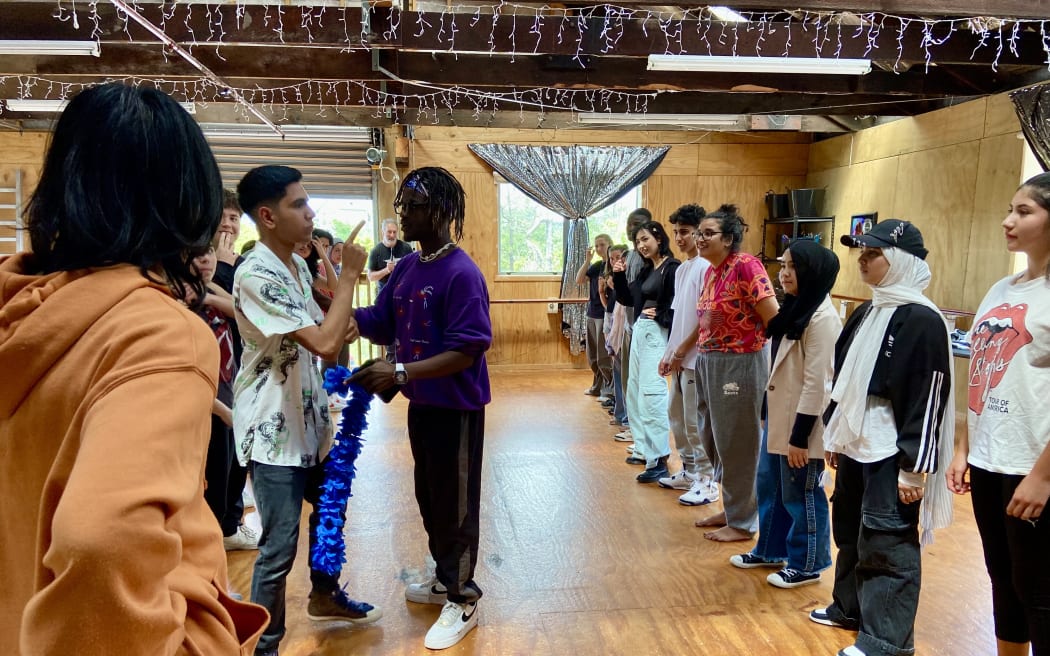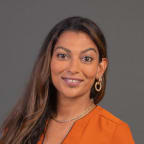
Photo:
FOLLOW Here Now on Apple Podcasts, Spotify, iHeart Radio or wherever you listen to your podcasts.
Izadine Ahmed Abdallah was 13 and in a refugee camp in Chad when he learnt that his family had been offered a refugee placement in New Zealand, a country he’d never heard of.
Now 24, Izzy has found purpose and fulfilment by helping a new generation of displaced people find their feet and their voices at MIXIT, a dance and drama school in New Lynn, Auckland.
“The youth grow too fast, so they forget the youth side. So, my job, or our job, is making sure the youth don't lose their youth side, they can still grow slowly.
“And they can be as creative as they want.”
Izzy knows what it's like to grow up quickly. At the age of 11 he left his family at the refugee camp where they were living, and walked to the neighbouring country of Cameroon.
His father had died from illness and Izzy couldn't bear to stay at the camp.
“He was like my best friend. When he passed away. I just didn't feel like being in that area. The best way was like me leaving the place or me committing suicide.
“Because I didn't feel like I belonged there. I didn't feel like I was alive. So, I decided to go to another place.”
Not wanting to visit his deep sadness on his family, he took himself off for two years.
“And there's no form to communicate by the way, you know, they didn't know, my family don't know where I'm at. But I know where they are.
“I left when I was 11. I came back when I was 13.”
When Izzy returned, he learned his family had been offered a refugee placement in New Zealand, a country he'd never heard of.
Touching down in Tāmaki Makaurau in the middle of the night, Izzy and his four siblings got something of a fright.
“So, we landed we had people coming and do a haka, we were surprised, because we’ve never seen this before.
“It was scary because we were kids at that time. We were hiding behind our mums. And we were like, what? What is this? What have we got ourselves into?”
New Zealand takes only 1500 refugees a year and according to the last census there are 231 Sudanese – mainly from the South. Izzy’s family are the only people from Darfur in West Sudan.
So, does that make it a bit more difficult?
“The language that we speak is called Masalit, in this country, no one speaks it.”
It wasn’t until he got to New Zealand, Izzy says, that people pointed out the colour of his skin.
“I learned racism in this country. Like in Chad growing up, we had a lot of white people around too, and there were racist ones, but no one comes and tells you what colour you are, because you already know what you are.
“When I came to New Zealand, going to school and someone comes up and calls me black. And I’m like 'whoa, I already know that. But I don't need to hear it.' You know? It kept happening. And I was fighting all the time, all the time because of that.”
School wasn't going brilliantly for Izzy, then a friend told him about this place where young refugees go to do drama and dance.
At 15, Izzy says, he was angry and shy.
“The first session I attend, they were dancing. It was just I think contemporary. I mean, I love dancing, but like every MIXIT session you go to there’s always music, and we always start with a dance.
“And it doesn't matter what topic we're doing. We always start with a dance. And I wanted to dance, but I'm too shy.”
That soon changed, Izzy says.
“The next week, when I came back, it's like I knew everybody. And my confidence just grew.”
At MIXIT, he became a group leader, and then an alumni. Now he works for them.
Most of the young New Zealanders at MIXIT started life in a refugee camp, or a war zone.
The fighting’s been intense in Izzy’s home country of Sudan. While the world's attention has been focused on Ukraine and Gaza, an estimated 10,000 Sudanese were killed between May and October last year.
Izzy says he avoids the news and learns what's going on from WhatsApp.
“We’ve got family group chat where they inform us everything that happened. I think it was two months ago, over 21 of my family got killed.
“So, it's just happening every day. I get sad and I don't like showing my emotions. And in that case, like I always tell my mum, I don't want to see it.
“But I do storytellings and I try to explain what's happening there, here, but it's hard, you know?”
This year 1.3 million more refugees have fled Sudan. Nearly five million people have been internally displaced.
“Over 35 years they just do the same thing over and over. People go and start new life and they will come and kill them again. They go start a new one, they come and burn their houses.
“I'm in this country where, these people never met me before, but when we got here, they did welcome us. And then they gave us a house. I go to school. I can go anywhere in this country freely, these are not my people, but they became my people.”
It's the dance and drama that Izzy learned at MIXIT that's had the biggest impact on his new life, getting him out of trouble and into helping others.
“They show me a different way of like surviving or living. They unlocked my creative side, inside that’s been hidden.
“And yeah, I didn't think without MIXIT I would be where I am today. Because… before I joined them, I was not going to school, kicked out because of the fighting.
“When I come here, I was like, I haven't had a fight since I joined MIXIT. So, they tell me to be humble, learn every day. And treat people the way you want to be treated.
“And yeah, life is just full of learnings, and I guess obstacles, well, we jump over, and we just carry on.”


